|
|
|
Sort Order |
|
|
|
Items / Page
|
|
|
|
|
|
|
| Srl | Item |
| 1 |
ID:
138268


|
|
|
|
|
| Summary/Abstract |
Amid the fallout from the Scottish independence referendum, a UK constitutional convention has been proposed as a mechanism to take stock not only of the referendum, but also of the past fifteen years of devolution. However, despite longstanding conceptions of British constitutional development, a constitutional convention would not herald a brave new world for the UK's constitution. As the article highlights, in the past hundred years there have been two attempts to treat the territorial constitution in the round: the Speaker's Conference on Devolution, 1919–1920 and the Royal Commission on the Constitution, 1969–1973. This article examines both of these forums, arguing that they provide clear warnings for a future UK constitutional convention, in particular the threat of internal division that any such forum risks facing. A danger that this article highlights is heightened by the associated difficulty of reaching agreement across the UK's ‘state of unions’.
|
|
|
|
|
|
|
|
|
|
|
|
|
|
|
|
| 2 |
ID:
086969
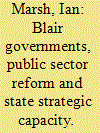

|
|
|
|
|
| Publication |
2009.
|
| Summary/Abstract |
Two books at the end of the Blair era-by Michael Barber and Julian Le Grand-offer to redeem the 'third way'. Both authors explore the political case for public sector reform and the means by which it can be accomplished. They explore a similar range of reform models: command and control; quasi-markets; and devolution and transparency. But the circle between efficiency, client service and continuous improvement must be squared. Neither author considers the 'learning by doing' alternative. No less fundamentally, neither author addresses the political and technical challenges in developing strategy. How are issues to be aired in advance so as to expose evidence and perspectives? How are interests to be engaged and supporting coalitions formed? How are these processes to occur without executive commitment? How are unconventional ideas to be aired without being over-ruled by populist or media sensationalism? These are the practical dilemmas that confounded Blair's efforts. These books invite a strategic conversation that is badly needed. But where in the political system can it be pursued?
|
|
|
|
|
|
|
|
|
|
|
|
|
|
|
|
| 3 |
ID:
129205
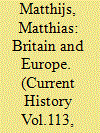

|
|
|
|
|
| Publication |
2014.
|
| Summary/Abstract |
After a tumultuous professional marriage of just over 40 years, Britain and Europe are facing the possibility of divorce. In January 2013, Prime Minister David Cameron decided to celebrate Britain's 40th anniversary as a member of the European Union by pledging a fundamental renegotiation of his country's terms of membership. Cameron further promised to submit any renegotiated deal to a clear "in-or-out" referendum in 2017 on whether or not to leave the EU, assuming his own Conservative Party wins a majority in the next general election in May 2015. Egged on by his party's growing ranks of restive Euroskeptics and trying to fight off a challenge on his right flank from populist Nigel Farage's UK Independence Party (UKIP), Cameron rolled the dice. He hoped to settle once and for all the Europe question, which has so often cast a dark shadow over the political debate in Westminster and Whitehall. Renegotiating
|
|
|
|
|
|
|
|
|
|
|
|
|
|
|
|
| 4 |
ID:
154661
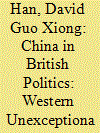

|
|
|
|
|
| Summary/Abstract |
How is the rise of China affecting world politics? Among Western International Relations scholars, most studies of China’s rise have focused on international-level implications—the balance of power between leading states, the future of regional and global orders, prospects for hegemonic war, and so forth—or the domestic politics of states along the periphery of the international system, especially in Central Asia and sub-Saharan Africa. In this article, I draw attention to the impact of China’s rise on the domestic politics of developed countries. In particular, I offer a case study of British politics between 2010 and 2016—a period during which politicians from both of Britain’s major political parties ‘weaponized’ China, so making it a significant feature of the domestic political topography. The overarching point is that momentous geopolitical shifts such as the rise of China are capable of reorienting domestic politics in developed (Western) countries just as much as they are in developing (non-Western) countries.
|
|
|
|
|
|
|
|
|
|
|
|
|
|
|
|
| 5 |
ID:
092399
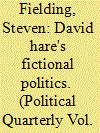

|
|
|
|
|
| Publication |
2009.
|
| Summary/Abstract |
David Hare is Britain's leading political dramatist. His Gethsemane premiered in November 2008, amidst anticipation that the play would 'crucify' New Labour. Gethsemane is in fact one of a number of fictionalisations of New Labour produced since 1997. These works have generally held up the party under Tony Blair's leadership to unmitigated criticism. Gethsemane certainly took Blair's premiership to task. However, despite increasing popular cynicism about Westminster politicians, Hare also suggested that politics remains a potential means through which honourable ends might still be achieved. However, already primed by the prevailing hostility to New Labour encouraged by earlier fictionalisations, few of those who reviewed Gethsemane noted Hare's tentative message of hope.
|
|
|
|
|
|
|
|
|
|
|
|
|
|
|
|
| 6 |
ID:
086975
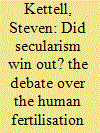

|
|
|
|
|
| Publication |
2009.
|
| Summary/Abstract |
The debate over the 2008 Human Fertilisation and Embryology Bill marks the latest in a series of conflicts between secularism and religion in the public sphere. The failure of religiously motivated campaigners to alter the Bill's most substantive and controversial provisions, however, should not be seen as a victory for a homogeneous secular camp. Although campaigners motivated by religious belief were almost universally opposed to the Bill, secular campaigners reflected a more varied mix of opinion. Moreover, the degree of organisation and mobilisation shown by the religious lobby during the course of the debate, are a sign that attempts to secure a greater role for religion in the public sphere are likely to remain a prominent feature of British political life.
|
|
|
|
|
|
|
|
|
|
|
|
|
|
|
|
| 7 |
ID:
111506
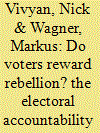

|
|
|
|
|
| Publication |
2012.
|
| Summary/Abstract |
To hold their Members of Parliament individually accountable for their legislative behaviour, British voters would need to base their decision to vote for an MP at least partially on the extent to which the MP's legislative voting behaviour deviated from that of the MP's party leadership. Voters should evaluate this deviation contingent on their views of the party leadership. MP rebellion can signal that voter-MP congruence is greater than that of the voter and the MP's party leadership. In this article it is found that only constituents with negative attitudes toward the Labour government reward rebellious Labour MPs, albeit to a limited extent. A similar conditional association is not observed on a single issue: Iraq. The policy accountability of MPs is relatively weak and general rather than issue-specific.
|
|
|
|
|
|
|
|
|
|
|
|
|
|
|
|
| 8 |
ID:
117498
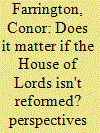

|
|
|
|
|
| Publication |
2012.
|
| Summary/Abstract |
In May 2011 the Coalition government published a draft bill for reform of the House of Lords, proposing an upper chamber composed of 80% elected and 20% appointed members serving for single 15-year terms. These plans reflect aspects of the stated positions of the main political parties, votes in the House of Commons, and broader political and scholarly debates over the past decade. Nevertheless, there is significant opposition from across the political spectrum, and there is a significant possibility that the proposed reforms will not be enacted before the next general election. This article draws on the views of participants (including three current peers) in a Symposium at Trinity Hall, Cambridge to argue that the likely failure of the reforms may be less disastrous than many suppose. Especially since the 1999 reforms, the House of Lords is in many ways a more active and legitimate chamber than is commonly realised.
|
|
|
|
|
|
|
|
|
|
|
|
|
|
|
|
| 9 |
ID:
091108


|
|
|
|
|
| Publication |
2009.
|
| Summary/Abstract |
This article analyses the importance of arguments developed since 1997 by influential right-wing commentators concerning Englishness and the United Kingdom. Drawing on historical, cultural and political themes, public intellectuals and commentators of the right have variously addressed the constitutional structure of the UK, the politics of devolved government in Wales and Scotland, and the emergence of a more salient contemporary English sensibility. This article offers case studies of the arguments of Simon Heffer, Peter Hitchens and Roger Scruton, all of whom have made controversial high-profile interventions on questions of national identity, culture and history. Drawing on original interviews with these as well as other key figures, the article addresses three central questions. First, what are the detailed arguments offered by Heffer, Hitchens and Scruton in relation to Englishness and the UK? Second, what does detailed consideration of these arguments reveal about the evolution of the politics of contemporary conservatism in relation to the Union? And, third, what kinds of opportunity currently exist for intellectuals and commentators on the fringes of mainstream politics to influence the terms of debate on these issues?
|
|
|
|
|
|
|
|
|
|
|
|
|
|
|
|
| 10 |
ID:
118220
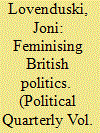

|
|
|
| 11 |
ID:
141764
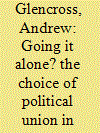

|
|
|
|
|
| Summary/Abstract |
This article explores the inter-related debates over Britain's relationship with the EU and that over the future of the UK. It argues that euroscepticism and Scottish independence are based on exceptionalist identities that now revolve around economic policy. Elite euroscepticism cleaves to a neoliberal vision of minimalist regulation, while advocates of Scottish independence claim Westminster's austerity policies make the British Union incompatible with social democracy. However, this presentation of the choice facing British voters ignores the serious contradictions that overhauling the current order entails. Both forms of exceptionalism fail to recognize the significant limitations of self-government outside and within the EU. If Conservatives can contain their neoliberal flirtation with EU withdrawal they are very well placed to prosper electorally. The dilemma of which union(s) to choose might thus constitute the prelude to the entrenchment of the economic and political order that gave rise to such contestation in the first place.
|
|
|
|
|
|
|
|
|
|
|
|
|
|
|
|
| 12 |
ID:
174010


|
|
|
|
|
| Summary/Abstract |
The use of political violence to attain political goals has long been a source of concern. Once thought to be exclusive to countries with high levels of general violence, recent evidence suggests that harassment and intimidation of political elites in the UK is more widespread than previously thought. Using data from the 2017 general election candidate survey, we find that four in every ten candidates experienced at least one type of harassment. Evidence suggests that women and young candidates are more likely to suffer from harassment and intimidation. We conclude by formulating an agenda for future research, focussing, in particular, on the perception of harassment and the effect of harassment on political careers.
|
|
|
|
|
|
|
|
|
|
|
|
|
|
|
|
| 13 |
ID:
133790
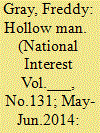

|
|
|
|
|
| Publication |
2014.
|
| Summary/Abstract |
Who is the real David Cameron? We'll probably never know-and he may not, either.
IN ANTHONY TROLLOPE'S NOVELPhineas Redux, Mr. Daubeny, a prime minister modeled on Benjamin Disraeli, proudly announces, "See what we Conservatives can do. In fact we will conserve nothing when we find that you do not desire to have it conserved any longer." It's a credo that Prime Minister David Cameron appears to live by.
|
|
|
|
|
|
|
|
|
|
|
|
|
|
|
|
| 14 |
ID:
138888
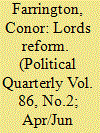

|
|
|
|
|
| Summary/Abstract |
The failure of the Coalition government's attempt to reform the House of Lords has by no means taken further reform off the political agenda. The commitment to installing an elected upper chamber is still widely shared across the political spectrum, on the basis of perceptions that the House of Lords lacks democratic legitimacy. Against this view, this article considers recent literature upon non-electoral representation, deliberative democracy and bicameralism, which together highlight the possibility of an unelected second chamber playing a legitimate role within a wider (democratic) system of government. The article then considers the House of Lords from this perspective, reflecting on changes in the upper chamber since the 1999 reforms and evaluating its role within the wider political system. The paper concludes by suggesting that political debate should focus upon small-scale reforms to ensure that the Lords becomes more effective, representative and legitimate, within the constraints of its present role.
|
|
|
|
|
|
|
|
|
|
|
|
|
|
|
|
| 15 |
ID:
093205
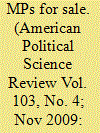

|
|
|
|
|
| Publication |
2009.
|
| Summary/Abstract |
Many recent studies show that firms profit from connections to influential politicians, but less is known about how much politicians financially benefit from wielding political influence. We estimate the returns to serving in Parliament, using original data on the estates of recently deceased British politicians. Applying both matching and a regression discontinuity design to compare Members of Parliament (MPs) with parliamentary candidates who narrowly lost, we find that serving in office almost doubled the wealth of Conservative MPs, but had no discernible financial benefits for Labour MPs. Conservative MPs profited from office largely through lucrative outside employment they acquired as a result of their political positions; we show that gaining a seat in Parliament more than tripled the probability that a Conservative politician would later serve as a director of a publicly traded firm-enough to account for a sizable portion of the wealth differential. We suggest that Labour MPs did not profit from office largely because trade unions collectively exerted sufficient control over the party and its MPs to prevent members from selling their services to other clients.
|
|
|
|
|
|
|
|
|
|
|
|
|
|
|
|
| 16 |
ID:
111501


|
|
|
|
|
| Publication |
2012.
|
| Summary/Abstract |
This article develops a cognitive institutionalist account of mass and elite evaluations of political ethics, which is tested on a new dataset from the United Kingdom. The analysis explores the extent of contemporary disagreement among British political elites and those they represent by comparing responses to questions asked in a representative survey of the public with similar questions asked of incumbent MPs and parliamentary candidates. There are systematic differences between members of the public, candidates and MPs at both aggregate and individual levels - differences which can be accounted for with reference to the framing effects of Parliament as an institution. Candidates for parliamentary office display significantly more tolerance of ethically dubious behaviour than other members of the public. Within the elite category, elected MPs exhibit more permissive ethical standards than those candidates who are unsuccessful.
|
|
|
|
|
|
|
|
|
|
|
|
|
|
|
|
| 17 |
ID:
027871
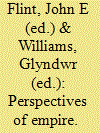

|
|
|
|
|
| Publication |
London, Longmen Group Limited, 1973.
|
| Description |
xii, 200p.Hbk
|
| Standard Number |
0582502640
|
|
|
|
|
|
|
|
|
|
|
|
Copies: C:1/I:0,R:0,Q:0
Circulation
| Accession# | Call# | Current Location | Status | Policy | Location |
| 012091 | 909.09171241/FLI 012091 | Main | On Shelf | General | |
|
|
|
|
| 18 |
ID:
114127
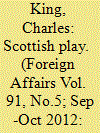

|
|
|
|
|
| Publication |
2012.
|
| Summary/Abstract |
As a referendum on Scotland's independence looms, the question of the region's place in the United Kingdom has become the most pressing issue in British politics. Its experience shows how a smart secessionist party can dismantle a functioning country, and how central governments eager to buy off regions can end up making matters worse.
|
|
|
|
|
|
|
|
|
|
|
|
|
|
|
|
| 19 |
ID:
111655


|
|
|
|
|
| Publication |
2012.
|
| Summary/Abstract |
In the aftermath of the August 2011 riots, politicians and commentators offered a range of explanations for the social unrest and wanton violence. Drawing on survey and focus-group data, this paper investigates those explanations by analysing how socio-economic, normative and political factors shape contemporary attitudes towards law breaking in Britain. The paper finds that both economic deprivation and personal moral values help to explain attitudes toward illegal behaviour, but citizens' mistrust of political leaders and their disengagement from public affairs are also an important factor. The findings suggest that politicians who want to provide moral leadership need to do so through their actions as well as their words.
|
|
|
|
|
|
|
|
|
|
|
|
|
|
|
|
| 20 |
ID:
128209
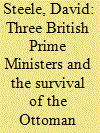

|
|
|
|
|
| Publication |
2014.
|
| Summary/Abstract |
Throughout the nineteenth century British statesmen had to concern themselves with the condition and prospects of the Ottoman Empire, both in Europe and the Near East. This article concentrates on the views and attitudes of Lord Palmerston, W.E. Gladstone, and the third Marquess of Salisbury, all of whom were in high office for over 30 years. Palmerston, who considered the Ottoman Empire an essential component in the balance of power, was the most Turcophile of the three. Gladstone attempted to bring into existence a Concert of Europe with authority to support the continued existence of the empire. Salisbury was prepared to contemplate an orderly dismemberment of it, in such a way as to reduce rivalry between the greater powers.
|
|
|
|
|
|
|
|
|
|
|
|
|
|
|
|
|
|
|
|
|